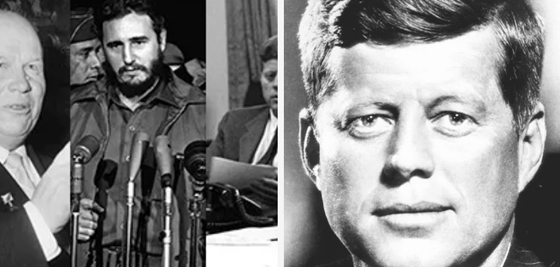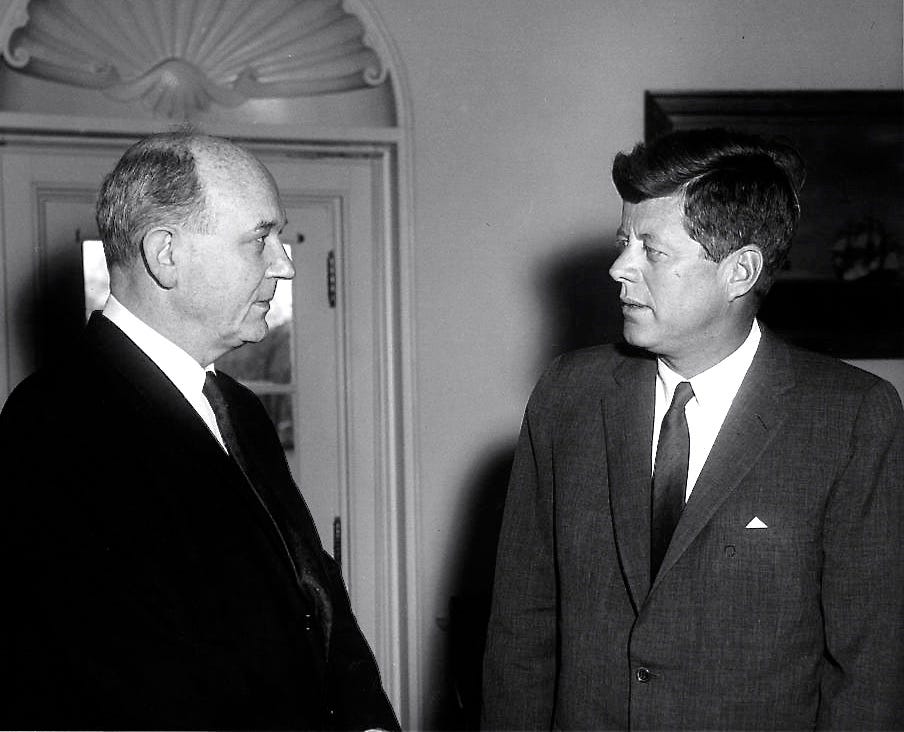Reprinted with permission from Greg Mitchell’s newsletter Oppenheimer: From Hiroshima to Hollywood.
Part II of Our Look Back at Nuclear Terror During Cuban Missile Crisis
Continuing a series begun earlier this week, as we look back 61 years this week to the beginnings of the gravest nuclear crisis of our era, involving JFK, Castro, and Soviet missiles in Cuba. The below is an excerpt from my 2016 bestseller, The Tunnels: Escapes Under the Berlin Wall, which among other things revealed the Kennedy White House trying to kill, that same autumn, one of the most important TV specials ever, from NBC, documenting an astounding underground passage to freedom.
Note: As I have long said, U.S. nuclear “first-use” policy remains in effect today, as dangers in the Middle East proliferate this month….

By nightfall on October 18, 1962, President Kennedy thought his executive committee, or ExComm, had reached a consensus on blockading Cuba without firing a shot in anger, but the next day this began to unravel. An early morning meeting with the Joint Chiefs, who still strongly advocated a preemptive U.S. strike, tested JFK’s resolve. McGeorge Bundy had shifted to that shoot-first position overnight. and it seemed that everyone’s emotions were dangerously fluid.
The President continued to play the Berlin card. Any attack on Cuba, he maintained, would give the Soviets “a clear line to take Berlin….We would be regarded as the trigger-happy Americans who lost Berlin.” European allies would be livid – they cared passionately about Berlin and their own security but didn’t “give a damn” about Cuba. And if the Soviets moved on Berlin this would leave him “only one alternative, which is to fire nuclear weapons – which is a hell of an alternative – and begin a nuclear exchange…. When we recognize the importance of Berlin to Europe, and recognize the importance of our allies to us, that’s what has made this thing be a dilemma for three days….” Remember, he added, the “argument for the [Cuba] blockade was that what we want to do is to avoid, if we can, nuclear war….”
Rarely have three words – if we can – signified so much.
General Curtis LeMay, the most hot-blooded hawk of all – one of his nicknames was “The Mad Bomber” – opposed a blockade on grounds that it would “lead right into war.” He also called it “weak” and compared it to “the appeasement at Munich.” He wanted a full bombing assault as soon as possible. LeMay addressed Kennedy, “You’re in a pretty bad fix at the present time.” Kennedy, angry, asked LeMay to repeat that. Then JFK replied with a laugh, “You’re in there with me!”
After the meeting Kennedy, always skeptical of advice from the military, said to an aide, referring to LeMay and his ilk, “These brass hats have one great advantage in their favor. If we listen to them, and do what they want us to do, none of us will be alive later to tell them that they were wrong.”
Still, the press and the public were kept in the dark. A Pentagon spokesman stated in response to a media query, “The Pentagon has no information indicating the presence of offensive weapons in Cuba.” The mechanics of a possible – some believed, likely – retaliatory Soviet blockade of West Berlin gained wide private study in Washington, however. David Klein, a National Security Council assistant, submitted a Top Secret memo to his boss, Mac Bundy, under the heading, The Defense of Berlin if Cuba is Blockaded. Klein wrote bluntly: A Soviet blockade “would inevitably stir feeling among all Europeans that this crisis was in some measure the fault of the Americans.” Most likely “Khrushchev would trade Berlin for Cuba any day,” which would be a “heavy net loss” for the U.S. Under a prolonged blockade, “with us sharing the blame,” the morale of Berlin would likely crack, and no one would fight a nuclear war for a “dying city.” Therefore, Klein advocated that we “shorten our reaction times” in the four-phase Poodle Blanket plan, “and be prepared to confront Khrushchev at a very early stage with a bluntly nuclear choice.”
For Dean Rusk, the tension of indecision was stifling. Taking the elevator from the State Department parking garage to his seventh floor office with George Ball and Dean Acheson, Rusk pointed to his security guards and said, “You know, the only decent advice I have had this past week has come from these two fellows.”
One of them, a former pro football lineman, responded, quite serious, “The reason for that, Mr. Secretary, is that you have surrounded yourself with nothing but dumb fucks.” Rusk laughed, as Ball and Acheson blushed.
Rusk (an architect and defender of our Vietnam tragedy) with Kennedy, below. In 1970 he was speaker at my college graduation. Like many others, I pointedly refused to shake his after grabbing my diploma.

Thanks for reading Oppenheimer: From Hiroshima to Hollywood! Subscribe for free to receive new posts and support my work.
Greg Mitchell is the author of a dozen books, including “Hiroshima in America,” and the recent award-winning The Beginning or the End: How Hollywood – and America – Learned to Stop Worrying and Love the Bomb, and has directed three documentary films since 2021, including two for PBS (plus award-winning “Atomic Cover-up”). He has written widely about the atomic bomb and atomic bombings, and their aftermath, for over forty years. He writes often at Oppenheimer: From Hiroshima to Hollywood.
